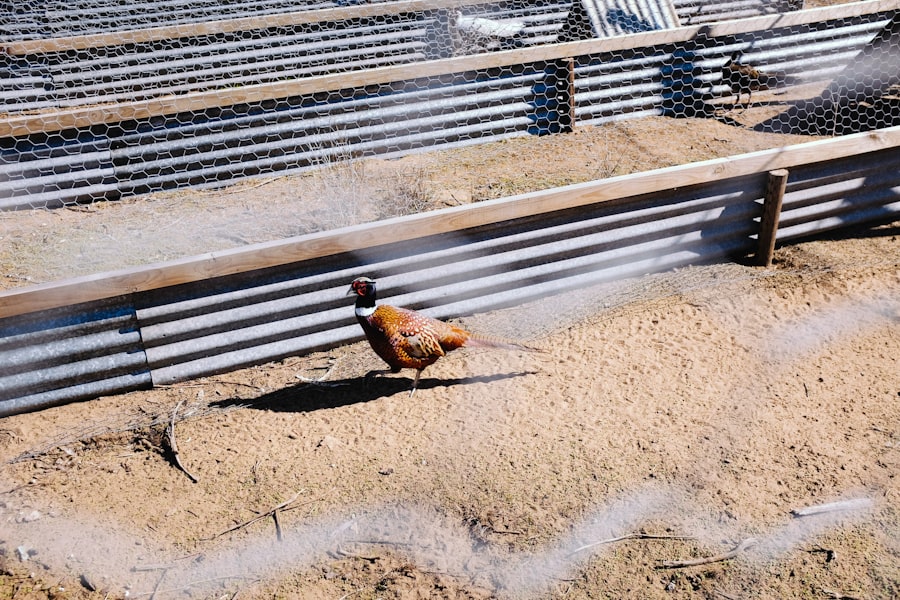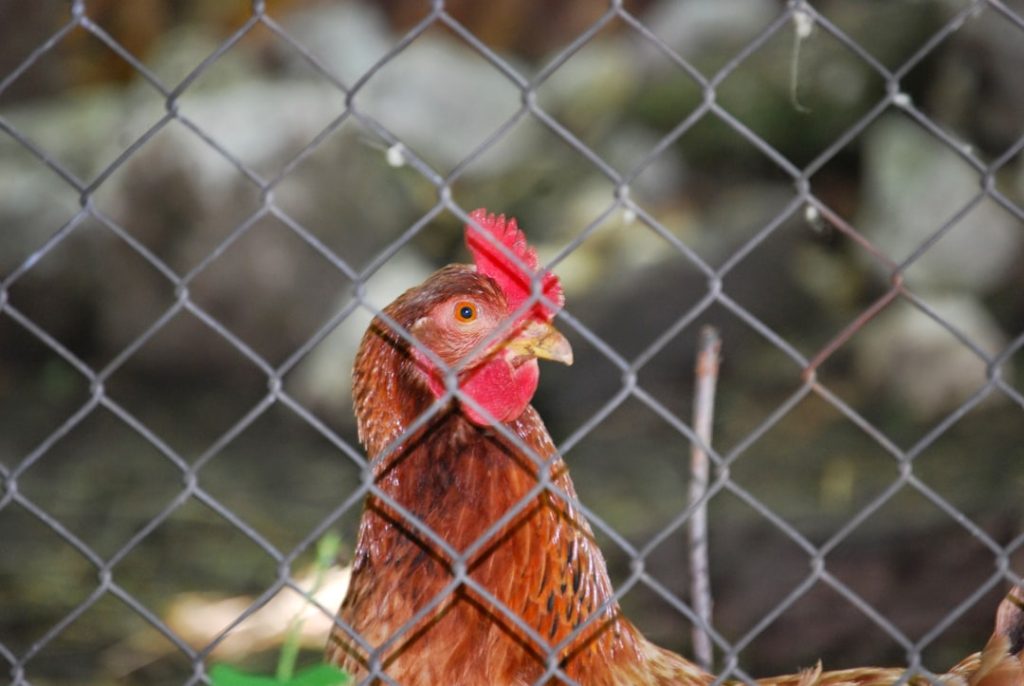Chickens are naturally curious and opportunistic creatures. They constantly search for food, exploring their surroundings in the process. This behavior can lead them to enter areas where they are not permitted, such as gardens or outdoor dining spaces.
Chickens are social animals and often follow the lead of other flock members. If one chicken discovers access to a particular area, others are likely to follow suit. Understanding these behaviors is essential for implementing effective strategies to keep chickens out of unwanted areas.
Chickens also exhibit a strong sense of routine. They tend to follow the same patterns and routes daily, making it easier to predict their movements and plan accordingly. By comprehending chicken behavior, one can better anticipate their actions and take proactive measures to prevent them from accessing restricted areas.
Table of Contents
- 1 Implementing Physical Barriers
- 2 Using Natural Deterrents
- 3 Creating a Distraction
- 4 Properly Storing Food and Waste
- 5 Seeking Professional Help
- 5.1 When All Else Fails: Seeking Professional Help
If you’ve tried various strategies to keep chickens out of unwanted areas but haven’t had success, it may be time to seek professional help. There are professionals who specialize in animal behavior and can provide valuable insights and recommendations for effectively managing chicken behavior.
- 5.2 Addressing Underlying Issues
- 5.3 Access to Specialized Knowledge and Expertise
- 5.1 When All Else Fails: Seeking Professional Help
- 6 Respecting Local Regulations
- 7 FAQs
- 7.1 What are some natural ways to keep chickens away from my yard?
- 7.2 Are there any commercial products available to keep chickens away from my yard?
- 7.3 How can I prevent chickens from entering my yard in the first place?
- 7.4 Are there any legal considerations to keep in mind when trying to keep chickens away from my yard?
- 7.5 What should I do if I encounter chickens in my yard despite my efforts to keep them away?
Key Takeaways
- Chickens are naturally curious and will explore their surroundings, so understanding their behavior is key to keeping them away from certain areas.
- Implementing physical barriers such as fences and netting can effectively keep chickens out of specific areas.
- Using natural deterrents like citrus peels, coffee grounds, or vinegar can help repel chickens from unwanted areas.
- Creating a distraction with a designated feeding area or providing toys can divert chickens’ attention away from restricted areas.
- Properly storing food and waste in secure containers can prevent chickens from being attracted to these areas.
- Seeking professional help from animal control or pest management experts may be necessary for persistent chicken-related issues.
- Respecting local regulations regarding the keeping and handling of chickens is important to avoid legal issues and conflicts with neighbors.
Implementing Physical Barriers
Installing Fences and Gates
One of the most effective ways to keep chickens out of unwanted areas is to implement physical barriers. This can include installing fences or gates around gardens or other sensitive areas. The key is to make sure that the barriers are tall enough to prevent the chickens from flying or jumping over them, and that they are secure enough to withstand the chickens’ attempts to break through.
Maintenance and Inspection
It’s also important to regularly inspect and maintain these barriers to ensure that they remain effective over time.
Alternative Barrier Options
Another option for implementing physical barriers is to use netting or mesh to cover vulnerable areas. This can be particularly useful for protecting crops or outdoor dining areas from chicken intrusion.
Creating a Barrier for Protection
By creating a physical barrier between the chickens and the area you want to protect, you can effectively deter them from accessing it.
Using Natural Deterrents

In addition to physical barriers, natural deterrents can also be effective in keeping chickens out of unwanted areas. For example, planting certain types of vegetation around sensitive areas can help deter chickens from venturing into them. Chickens are known to avoid certain plants and herbs, such as lavender, mint, and marigolds, so strategically planting these around gardens or other vulnerable areas can help keep them at bay.
Another natural deterrent that can be effective in keeping chickens away is the use of predator decoys. Placing decoys of natural predators, such as owls or hawks, in strategic locations can help create the illusion of danger and discourage chickens from entering those areas. It’s important to regularly move these decoys around to prevent the chickens from becoming accustomed to their presence.
Creating a Distraction
Another effective strategy for keeping chickens out of unwanted areas is to create a distraction that will draw their attention elsewhere. This can be done by providing alternative sources of food and entertainment in areas where you want to keep the chickens away from. For example, setting up a designated feeding area with a variety of treats and scratch grains can help keep the chickens occupied and less inclined to venture into other areas.
In addition to providing alternative sources of food, creating a distraction can also involve introducing new elements into the chickens’ environment to pique their curiosity. This can include hanging shiny objects or setting up temporary structures that will capture the chickens’ attention and keep them occupied. By creating a distraction, you can redirect the chickens’ focus away from the areas you want to protect.
Properly Storing Food and Waste
One of the main reasons why chickens may venture into unwanted areas is in search of food or waste. To prevent this, it’s important to properly store food and waste in secure containers that are inaccessible to the chickens. This includes keeping garbage cans tightly sealed and storing feed in secure containers that cannot be easily accessed by the chickens.
In addition to proper storage, it’s also important to regularly clean up any spilled food or waste in outdoor areas. This will help eliminate any potential attractants that may draw the chickens into those areas. By properly storing food and waste, you can help reduce the likelihood of chickens venturing into unwanted areas in search of sustenance.
Seeking Professional Help

When All Else Fails: Seeking Professional Help
If you’ve tried various strategies to keep chickens out of unwanted areas but haven’t had success, it may be time to seek professional help. There are professionals who specialize in animal behavior and can provide valuable insights and recommendations for effectively managing chicken behavior.
Expert Solutions for Unique Situations
These experts can assess your specific situation and provide tailored solutions to address the issue at hand. They can help you identify the root cause of the problem and develop a plan to keep your chickens where they belong.
Addressing Underlying Issues
In some cases, seeking professional help may also involve consulting with a veterinarian or animal behaviorist to address any underlying health or behavioral issues that may be contributing to the chickens’ unwanted behavior. By identifying and addressing these underlying issues, you can develop a more effective and sustainable solution.
Access to Specialized Knowledge and Expertise
By seeking professional help, you can gain access to specialized knowledge and expertise that can help you effectively manage and mitigate the issue of chickens accessing unwanted areas. With the right guidance and support, you can keep your chickens happy and healthy, while also protecting your property and garden.
Respecting Local Regulations
When implementing strategies for keeping chickens out of unwanted areas, it’s important to respect local regulations and ordinances that may govern the keeping and management of poultry. This includes understanding any zoning laws or restrictions related to keeping chickens on your property, as well as any regulations related to animal control and nuisance wildlife management. By respecting local regulations, you can ensure that you are taking appropriate measures to address the issue of chickens accessing unwanted areas while also staying in compliance with applicable laws and regulations.
This may involve obtaining permits or approvals for certain types of barriers or deterrents, or working with local authorities to address any concerns related to chicken behavior in your area. In conclusion, understanding the behavior of chickens is crucial when it comes to implementing effective strategies for keeping them out of unwanted areas. By using a combination of physical barriers, natural deterrents, distractions, proper food and waste storage, seeking professional help, and respecting local regulations, you can effectively manage chicken behavior and prevent them from accessing sensitive areas.
With careful planning and proactive measures, you can create a harmonious coexistence between chickens and human spaces.
If you’re looking for ways to keep chickens away from your yard, you may also be interested in learning about the mating season for turkeys. Understanding the behavior of different poultry can help you better manage their presence in your yard. Check out this article on mating season for turkeys to gain more insight into the habits of these birds.
FAQs
What are some natural ways to keep chickens away from my yard?
Some natural ways to keep chickens away from your yard include using strong-smelling herbs and plants, such as lavender, mint, or marigolds, as well as using physical barriers like fences or chicken wire.
Are there any commercial products available to keep chickens away from my yard?
Yes, there are commercial products available, such as chicken repellent sprays or electronic deterrent devices, that can help keep chickens away from your yard.
How can I prevent chickens from entering my yard in the first place?
To prevent chickens from entering your yard, you can make sure to keep any food sources, such as bird feeders or compost piles, covered and secure. Additionally, keeping your yard clean and free of debris can help deter chickens from entering.
Are there any legal considerations to keep in mind when trying to keep chickens away from my yard?
It’s important to check with local ordinances and regulations before taking any action to keep chickens away from your yard, as there may be specific laws regarding the treatment of chickens in your area.
What should I do if I encounter chickens in my yard despite my efforts to keep them away?
If you encounter chickens in your yard despite your efforts to keep them away, it’s best to contact the owner of the chickens, if known, or local animal control for assistance in resolving the situation.

Meet Walter, the feathered-friend fanatic of Florida! Nestled in the sunshine state, Walter struts through life with his feathered companions, clucking his way to happiness. With a coop that’s fancier than a five-star hotel, he’s the Don Juan of the chicken world. When he’s not teaching his hens to do the cha-cha, you’ll find him in a heated debate with his prized rooster, Sir Clucks-a-Lot. Walter’s poultry passion is no yolk; he’s the sunny-side-up guy you never knew you needed in your flock of friends!
Meet Walter, the feathered-friend fanatic of Florida! Nestled in the sunshine state, Walter struts through life with his feathered companions, clucking his way to happiness. With a coop that’s fancier than a five-star hotel, he’s the Don Juan of the chicken world. When he’s not teaching his hens to do the cha-cha, you’ll find him in a heated debate with his prized rooster, Sir Clucks-a-Lot. Walter’s poultry passion is no yolk; he’s the sunny-side-up guy you never knew you needed in your flock of friends!







